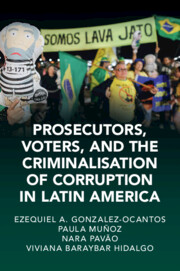Book contents
- Prosecutors, Voters, and the Criminalisation of Corruption in Latin America
- Cambridge Studies in Law and Society
- Prosecutors, Voters, and the Criminalisation of Corruption in Latin America
- Copyright page
- Contents
- Figures
- Tables
- Acknowledgements
- 1 Introduction
- Part I Causes
- 2 The Drivers of Prosecutorial Zeal
- 3 Lava Jato in Peru
- 4 One Crusade and Two Failed Inquiries
- Part II Public Reactions
- Part III Conclusions
- Bibliography
- Index
- Cambridge Studies in Law and Society
2 - The Drivers of Prosecutorial Zeal
Institutional Change and Three “Moments” (with Stories from Brazil, Italy, and Beyond)
from Part I - Causes
Published online by Cambridge University Press: 05 April 2023
- Prosecutors, Voters, and the Criminalisation of Corruption in Latin America
- Cambridge Studies in Law and Society
- Prosecutors, Voters, and the Criminalisation of Corruption in Latin America
- Copyright page
- Contents
- Figures
- Tables
- Acknowledgements
- 1 Introduction
- Part I Causes
- 2 The Drivers of Prosecutorial Zeal
- 3 Lava Jato in Peru
- 4 One Crusade and Two Failed Inquiries
- Part II Public Reactions
- Part III Conclusions
- Bibliography
- Index
- Cambridge Studies in Law and Society
Summary
What leads prosecutors to become crusaders in contexts where there are few precedents of Hollywood-style “prosecutor-heroes,” evidence is thin and risks high? Combining theories of the drivers of bureaucratic autonomy with analyses of crusades in Brazil and Italy, the chapter locates the origins of zealous prosecutorial role-conceptions in processes of institutional change and three “moments” (serendipity, agency, and backlash), blending structural and agentic factors. That prosecutors challenge the establishment, triggering a cascade of evidence with unorthodox tactics, is a function of institutional autonomy, criminal law reforms, and bureaucratic differentiation. Inquiries are also shaped by tactical choices, in particular, whether prosecutors form taskforces. Based on research in economics and psychology, the chapter shows that small groups are conducive to evidentiary economies of scale, legal innovation, and defensive strategies. The argument thus specifies the incentives guiding prosecutors, with attention to the organisations within which they operate. It also shows why zeal is both the engine of crusades but also the likely source of their undoing.
Keywords
- Type
- Chapter
- Information
- Prosecutors, Voters and the Criminalization of Corruption in Latin AmericaThe Case of Lava Jato, pp. 27 - 73Publisher: Cambridge University PressPrint publication year: 2023



